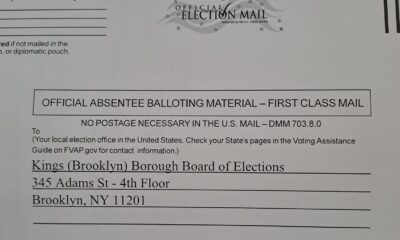
OpEds

Jewish voters may help swing US election
If the United States elected its president via a national popular vote, discussions of the impact and influence of racial, ethnic, and religious minority groups might not be particularly consequential. However, the nation doesn’t elect its national leadership that way. Instead, the presidential election is essentially 50 individual elections – plus the District of Columbia – brought together.
It’s important to understand the system. When a candidate wins the popular vote in a state, that candidate gains the state’s full electoral vote apportioned on the basis of population, equal to the number of members of Congress of each state. Winning a state by a million votes or just 10 000 means a candidate gets all the electoral votes, except in two small population states. There are a total of 538 electoral votes, and so the candidate who gains at least 270 electoral votes wins the presidency.
Because of this system, minority groups can have real consequences in determining whether a state’s electoral votes are gained by a candidate in America’s basically two-party system. Religious and ethnic minorities thus may have real weight in hotly contested battleground or swing states.
In this election, these are Pennsylvania, Michigan, Wisconsin, Georgia, North Carolina, Arizona, and Nevada. According to polling in those states, overall, there is close to a 50-50 split among registered voters between Donald Trump and Kamala Harris.
Thus, even small shifts in support among some ethnic groups could have a real impact on the results in those states. Most of the states with significant numbers of Jewish voters – New York; New Jersey; California; Maryland; Illinois; Massachusetts; and Connecticut – are solidly Democratic Party-supporting states. Thus small shifts of support among Jewish voters would have marginal impacts. However, in Pennsylvania, Arizona, and Michigan, with their nearly 50-50 splits and significant Jewish populations, shifts of just a few percentage points among Jewish voters could have a real impact.
Similar circumstances also help explain the potential impact of about 300 000 Muslim- and Arab-Americans in Michigan. Harris’s loss there would make her victory that much more difficult, and it might be a bellwether for other swing states. Muslim- and Arab-Americans have, historically, most often voted for the Democratic Party’s candidates, and their numbers have grown substantially via immigration in recent years. Crucially, in the past year, the fighting in Gaza and now Lebanon and the ferocity of the Israeli military campaigns, has made the conflict a fiercely contested issue for those voters.
Over the years, Trump has often demonstrated a distain for Arab- and Muslim-American voters and the Muslim world more generally. Further, he continues to offer strong support for Israeli Prime Minister Binyamin Netanyahu’s policies, tactics, and strategies. Additionally, he has been vocal – particularly to Jewish voters – about his actions to support Israel as the pre-eminent force in the Middle East; his success with the “Abraham Accords”; the relocation of the United States Embassy to Jerusalem; and America’s withdrawal from a nuclear accord with Iran.
Meanwhile, however, many Arab- and Muslim-American voters say they feel deeply let down by incumbent President Joe Biden’s – and by extension Harris’s – support for Israel, along with a seemingly limited ability to change the course of that conflict, to successfully exert pressure on Netanyahu, or to demonstrate substantial support for the increasingly beleaguered residents of Gaza, and now those in southern Lebanon as well.
For nearly a century, Jews have been more loyal to the Democrats than almost any other ethnic minority, save perhaps among African Americans in the south, once they had secured the right to vote as a result of the Voting Rights Act and the civil rights movement. Jewish voting patterns paralleled other ethnic minority voters in northern cities, especially where machine politics administrations stayed strong.
Among many, perhaps most, American Jews, fighting in the Middle East over the past year has also generated significant consternation, confusion, and fear. For some, the long-held consensus support for Israel has become subject to dispute and despair. Some American Jews have rallied against the Israeli military responses to the events of 7 October, even though support of Israel as a nation with the right to defend itself largely remains.
Among a much smaller group post-7 October, some have rejected supporting Israel, given the policies of the Netanyahu government. And some have joined university and other protests against Israeli military actions. Historically, there has always been vigorous dialogue among American Jews over whether their allegiance to America is unconditional, or if some degree of support must adhere to Israel as well. Some ultra-conservative religious communities embrace the view that Israel is a secular entity and not the promised messianic state of prayer and tradition.
Nevertheless, the allegiance of a majority of American Jews to the Democrats remains, despite some reservations that there may be a shift by Harris away from unwavering support for Israel.
New survey data from the Pew Research Center – the respected attitude survey organisation – from August 2024 says, “Harris currently has the backing of roughly two-thirds or more registered voters in various other religious groups: 86% of black Protestants; 85% of atheists; 78% of agnostics; 65% of Hispanic Catholics; [and] 65% of Jewish voters.”
That latter figure is apparently somewhat below the top levels for Jewish voters in some past elections, but not dramatically so, and remains close to support levels from Jewish voters when Biden was still the candidate.
On the core electoral issues, Pew says, “Certain issues are highly important to voters regardless of religious group. For instance, at least six-in-10 registered voters in every religious group say the economy will be very important in their voting decision. And half or more in almost every religious group say the same about health care, Supreme Court appointments, and foreign policy. About six-in-10 agnostics (62%); Jewish voters (59%); and black Protestants (57%) also say abortion will be very important in deciding how to vote this fall.”
A report issued by the Jewish Electorate Institute (JEI) two months before the 7 October attack found that “Jewish voters remain focused on the cultural issues that divide the country: democracy, abortion, and guns, in addition to inflation and climate change. Abortion continues to be a defining issue among Jewish voters, with 88% believing it should be legal, and 80% concerned that women no longer have the constitutional right to abortion. Jewish voters also prioritise inflation and climate change.”
Said the JEI, “In a polarised political environment that divides the country, Jewish voters continue to be firmly entrenched in the Democratic camp. Biden has high job approval [67%], Trump is reviled [19% favourable/80% unfavourable], other Republican leaders are also viewed very negatively, Democrats are far more trusted on all major issues, and Biden leads Trump 72-22 in a presidential match-up.”
Even before the 7 October attack and Israel’s response, the survey noted though most Jewish voters “still feel emotionally attached to Israel [72%] they also hold seriously negative views about Netanyahu [28% favourable/62% unfavourable]”. That support may well have fallen further by now.
If one were to make any prediction, the most important votes by Jewish Americans will be those cast in the suburbs near the big cities of swing states like Pennsylvania, Michigan, and Arizona. We’ll know soon enough what they choose.
- Brooks Spector settled in Johannesburg after a career as an American diplomat in Africa and East Asia. He has taught at the University of the Witwatersrand, been a consultant for an international nongovernmental organisation, run a Johannesburg theatre, and been a commentator for South African and international print/broadcast/online media. Spector has also been a Bradlow Fellow of the South African Institute of International Affairs and a writing fellow of the University of Johannesburg’s Institute for Advanced Studies.











Jessica
November 2, 2024 at 6:56 pm
Trust the irredeemably woke Mr Spector to use this as an opportunity to disgorge his anti-GOP sentiments, not to mention his barely concealed TDS.